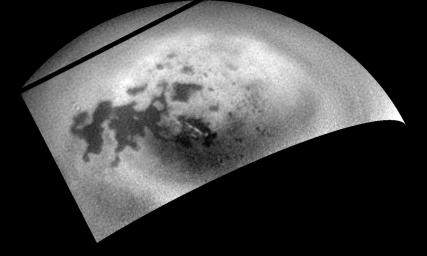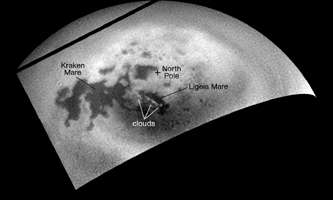
|
Northern Clouds Return to Titan
- Click the image above for a larger view
- Full-Res JPEG (1307 x 784) (115.6 kB)
- Full-Res TIFF (1307 x 784) (1.0 MB)
Caption:

Click on the image for larger annotated version
As NASA's Cassini spacecraft sped away from Titan following a relatively close flyby, its cameras monitored the moon's northern polar region, capturing signs of renewed cloud activity.
Cassini scientists noted a decrease in clouds everywhere on Titan after a large storm in 2010, and expected clouds to return sooner, based on computer models of Titan's atmosphere. Continued monitoring should help them determine if the clouds' appearance signals the beginning of summer weather patterns, or if it is an isolated occurrence.
A streak of methane clouds is seen here, near center, over the large methane sea known as Ligeia Mare. A movie sequence, PIA18420 , shows these clouds in motion over a two-day period.
An image taken on July 21, 2014 using the Cassini spacecraft's narrow-angle camera was reprojected to create this orthogonal view.
Background Info:
The Cassini-Huygens mission is a cooperative project of NASA, the European Space Agency and the Italian Space Agency. NASA's Jet Propulsion Laboratory, a division of the California Institute of Technology in Pasadena, manages the mission for NASA's Science Mission Directorate, Washington. The Cassini orbiter and its two onboard cameras were designed, developed and assembled at JPL. The imaging operations center is based at the Space Science Institute in Boulder, Colo.
For more information about the Cassini-Huygens mission visit http://saturn.jpl.nasa.gov and http://www.nasa.gov/cassini . The Cassini imaging team homepage is at http://ciclops.org .
Cataloging Keywords:
| Name | Value | Additional Values |
|---|---|---|
| Target | Titan | |
| System | Saturn | |
| Target Type | Satellite | |
| Mission | Cassini-Huygens | |
| Instrument Host | Cassini Orbiter | |
| Host Type | Orbiter | |
| Instrument | Imaging Science Subsystem (ISS) | |
| Detector | Narrow Angle Camera | |
| Extra Keywords | Atmosphere, Grayscale, Methane, Storm, Visual | |
| Acquisition Date | ||
| Release Date | 2014-08-12 | |
| Date in Caption | 2014-07-21 | |
| Image Credit | NASA/JPL-Caltech/Space Science Institute | |
| Source | photojournal.jpl.nasa.gov/catalog/PIA18421 | |
| Identifier | PIA18421 | |
